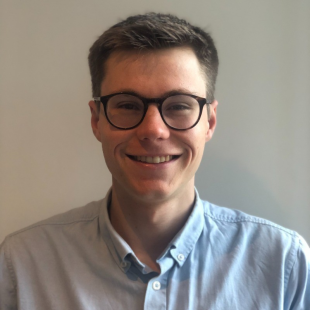| Name | Fraser Roach |
| Degree Title | MEng Mechanical Engineering |
| Year of Graduation | 2023 |
What path has your career taken since graduation?
At the start of my final year, I still had not decided what I wanted to do after graduating. Whilst I enjoyed my industrial placement in building services and found it very worthwhile, I felt that I was not well-suited to this industry and instead started to look into renewables or clean energy. I started applying to various nuclear and wind energy engineering roles but without really feeling like they were what I was looking for, which likely led to my limited success in those application processes. Things started improving in the second semester when I started the Wind Energy 5 course which introduced me to energy yield analysis, an area which I found very interesting and seemed better aligned with my strengths. Within a couple of weeks, I came across a graduate role in that field and after a successful interview process I started working in the September after graduating.
What is your current role?
I am currently a Wind Analyst within the Analysis Services team at K2 Management. As a consultancy, we deliver energy yield assessments for developers and investors of renewable energy projects. My job is to determine the likely annual energy production of wind farms before construction begins, providing a crucial input to financial models which ensure renewable projects go ahead and can be successful. A yield assessment typically starts with data analysis of measured wind data in order to generate the long-term wind speed at the site. A computational flow model is then used to determine the variation in wind speed across all the turbines in the wind farm. The energy produced by each turbine can be calculated by modelling the interaction of the turbine wakes and then applying other losses to obtain a final energy yield. I have so far worked on onshore and offshore projects across Europe, Asia and Australia. Most projects are relatively short so there is a lot of variety as you move between projects. I find it very rewarding to contribute to these renewable energy projects in a role that is technically challenging and still developing in a relatively young industry.
What experiences do you feel helped you get to your current position?
Making the most of the wide-ranging course choices in my final year was hugely beneficial. By choosing courses that interested me, I was able to study renewables in greater detail and learn more about computational modelling. When I applied for a position that combines these areas, I had plenty to talk about in the interview and demonstrate my knowledge.
How have you used the skills and/or knowledge developed during your degree in your career?
My day-to-day job strongly relies and builds on the analysis and problem-solving skills I acquired throughout my degree. In terms of specific knowledge, Wind Energy 5 provided me with a solid foundation of several of the techniques used in wind analysis. CFD 5 also taught me a lot about computational flow modelling that is very relevant when investigating the wind flow across different sites. In my role, we are encouraged to contribute to development of our internal tools which mostly requires coding in python so there has been a benefit to learning how to code at university.
What advice would you give to students who are interested in your area of work?
I would recommend making the most of your time at university to discover what you enjoy, as well as what you are good at. Use the final year course choices, industrial placement and engineering student societies to try new things and gain valuable skills for the future.
I would also say don’t worry too much about having everything figured out early. It took me a while to find what I needed to, but this made me sure of what I wanted and that clearly stands out when you are applying for graduate jobs
This profile was published in July 2024



